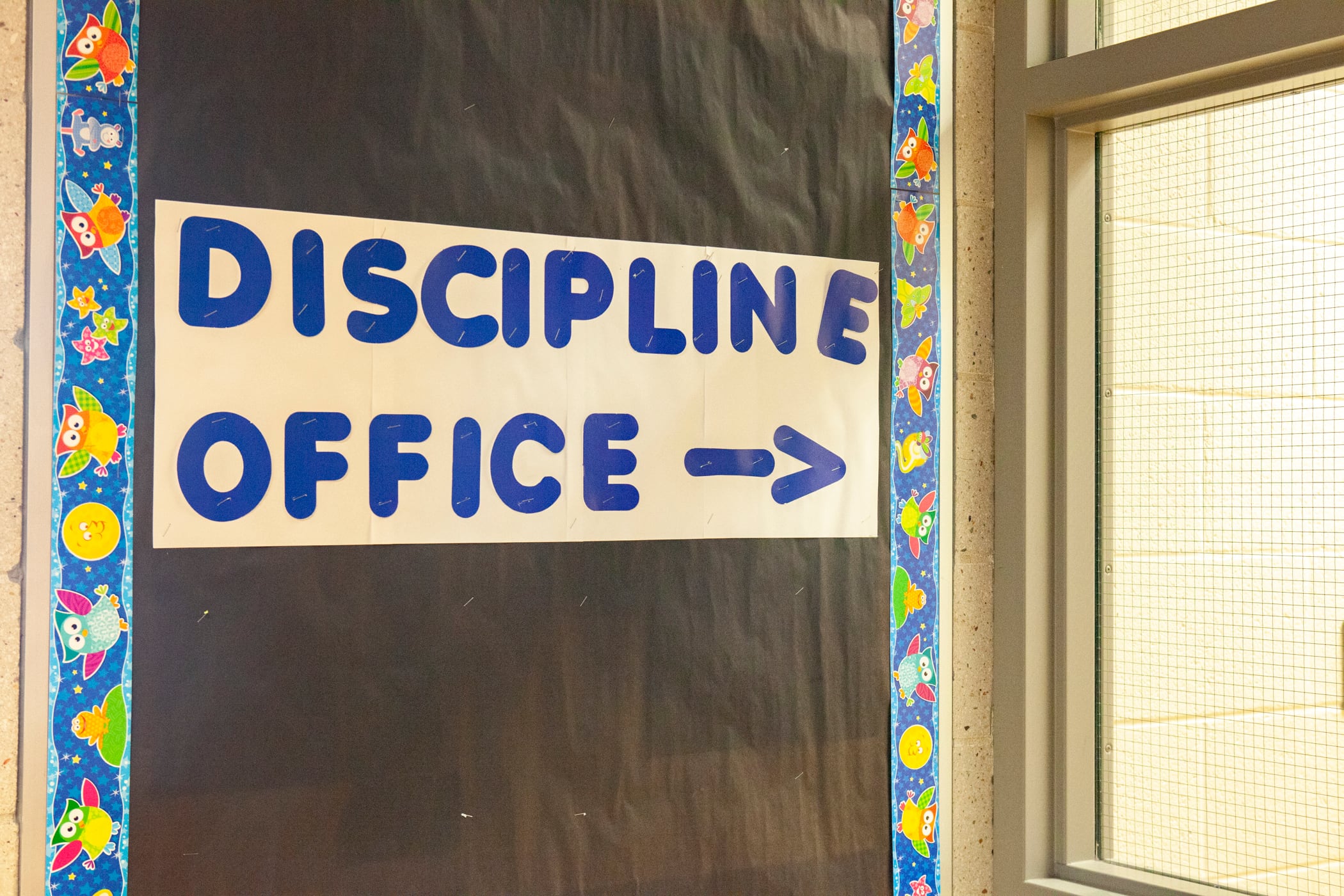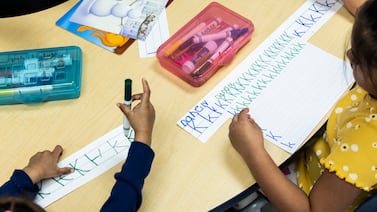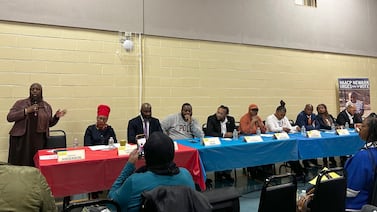Sign up for Chalkbeat Chicago’s free daily newsletter to keep up with the latest education news.
The Illinois State Board of Education has closed its investigation into Chicago Public Schools’ use of physical restraint and timeout practices, citing “significant strides” the district has made to ensure staff is trained in using restraints in schools.
The state board started an investigation into Chicago Public Schools in the fall of 2022, citing staff using restraints when there wasn’t a danger to a student or staff, reports of untrained staff using restraints on students, not having a designated official to be notified of incidents and maintain documentation, and parents not being alerted when their child was involved in a restraint or timeout incident. The state said Chicago was putting students at risk by not training staff on the proper use of restraint and timeout.
The state told the district that it needed to train at least two staff members in each school building in the proper use of physical restraint and timeout, designate a district official to maintain records regarding incidents where restraint or time out is used, and create and sustain a list on the CPS website of staff members that have been trained.
The state board informed CPS officials that it had closed its systemic complaint investigation into the district’s restraint and timeout practices in a letter dated Sept. 18.
The state defines physical restraint as holding a student or other methods to restrict a student’s movement. Prone restraint — when a student is placed face down and pressure is applied to their body to prevent them from moving — has been outlawed in the state with a bill signed by Gov. J.B. Pritzker in 2021.
Students can be restrained if there is “imminent danger” to themselves or others around them, but staff must be trained in how to properly use restraints.
A spokesperson for the Illinois State Board of Education told Chalkbeat that the state board decided to close the investigation for several reasons: Chicago Public Schools has trained all staff on timeout and isolated timeout, hired and trained an administrator specifically tasked with reviewing all physical restraint and timeout incidents across the district, and now has a public list of staff who went through training on its website that’s searchable by school and staff member name.
Four individual complaints are still ongoing, the state board noted in the letter, saying it will continue to monitor the district “to ensure CPS’ ongoing compliance and improvement of practices” related to restraint and timeout.
A spokesperson for Chicago Public Schools told Chalkbeat Chicago that it continues to refine the district’s actions related to restraint and timeout. In a statement, the district said it “is fully focused on identifying proactive behavioral interventions to reduce the use of RTO, especially for students of color.”
The district’s office for special education has created a Physical Restraint Time Out Team, which is responsible for documenting incidents, school staff has been fully trained in de-escalation and physical management techniques, and the district is working closely with schools if additional training is needed, according to the district spokesperson.
Chicago Public Schools reports that 5,140 staff members across schools are fully trained in both de-escalation and physical management techniques as of this month.
Between 2022 and 2023, the state board sent multiple letters of noncompliance to Chicago school officials that identified how the district’s current restraint and timeout policies were not aligned with the state’s current guidance. The state board found that untrained staff were using restraints.
In a few cases, staff were either restraining students for more than 15 minutes and placing students in isolated time outs for more than 30 minutes. Under state law, staff must evaluate if students should be taken out of timeout or restrains every 15 to 30 minutes.
In other cases, restraints that were banned by state law, such as prone restraint, were used on students. School officials did not tell parents that their child had been restrained or placed in timeout within the time frame set by the state. According to the state board, parents must be notified as soon as possible but no longer than two days after the incident.
Changes in state law occurred in response to a 2019 Chicago Tribune and ProPublica investigation that revealed how restraint, timeout, and seclusion were used around the state. Students with disabilities were most likely to be restrained or put in timeout.
As the state board’s investigation ramped up during 2023, there were changes in leadership at Chicago Public Schools and the district had to act quickly to be in compliance with state law or be placed on probation by the state.
Stephanie Jones, the former head of Chicago Public Schools’ special education office, left the district in June 2023 amid criticism for her role in the district’s failure to fix violations related to restraint and timeout.
As the designated official responsible for restraint and timeout policies and incidents. Jones was responsible for maintaining copies of records, receiving notifications of incidents each school day, and receiving documentation and evaluation of any incident of restraints that lasted for over 15 minutes and timeouts over 30 minutes.
However, Jones told the state board that she had passed on those responsibilities to another member of her staff who left earlier in the year and no one continued to monitor incidents in schools.
Jones was later replaced by Joshua Long, a former principal, as head of the district’s special education office in December 2023.
Chicago Public Schools was required to train at least two staff members across the district’s 600 schools in August 2023 or risk being placed on probation by the state. Chicago worked with contractor QBS LLC to train staff on the use of restraint and timeout.
In August of last year, district officials said CPS had met the state’s deadline to train at least two staff members in over 500 school buildings with a majority of staff being completely trained or in progress in de-escalation and physical restraint.
Samantha Smylie is the state education reporter for Chalkbeat Chicago covering school districts across the state, legislation, special education and the state board of education. Contact Samantha at ssmylie@chalkbeat.org.






